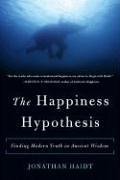Helpful Score: 2
I am hesitant to ever say this about a book, but I'll say it anyway: This book is life-changing. I was floored with the psychology of why we believe what we do and why we think "our" way of thinking is really and truly -seriously- more enlightened than anyone else's. When you read all the studies and evidence the author has for our somewhat self-delusional way of thinking, you cannot help but be humbled. It's human nature - it's not a choice we make. You'll drop a little ego reading this.
Also, the author is a self-proclaimed Jewish atheist political liberal and for someone so forthcoming with that information one would think he'd have an agenda. Not at all. He's the most objective, fairest author I've read. He gives equal criticism and praise to both "sides" - religious vs. atheist, liberal vs. conservative, Eastern philosophy vs. Western philosophy. Going further, he explains what we can, and should, learn from both sides.
He gives ideas - and proof - of what you can do in your daily life to increase happiness. This book is amazing and changed my mind from believing that positive psychology was merely "pop" psychology. Five stars.
Also, the author is a self-proclaimed Jewish atheist political liberal and for someone so forthcoming with that information one would think he'd have an agenda. Not at all. He's the most objective, fairest author I've read. He gives equal criticism and praise to both "sides" - religious vs. atheist, liberal vs. conservative, Eastern philosophy vs. Western philosophy. Going further, he explains what we can, and should, learn from both sides.
He gives ideas - and proof - of what you can do in your daily life to increase happiness. This book is amazing and changed my mind from believing that positive psychology was merely "pop" psychology. Five stars.




